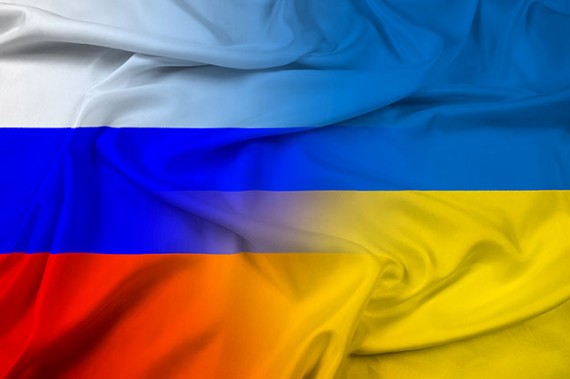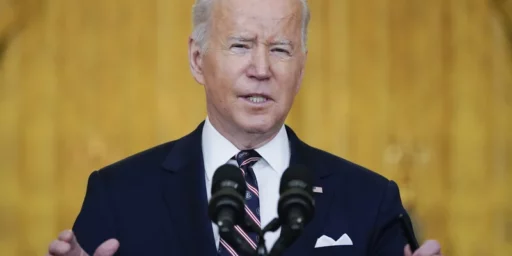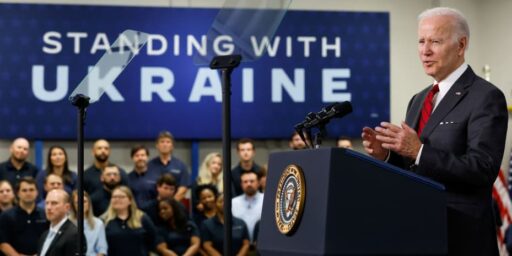U.S. Accuses Russia Of Arming Separatists
The Obama Administration is accusing the Russians of continuing the arm pro-Russian separatists in eastern Ukraine despite previous claims by Moscow that they were not doing so:
WASHINGTON — On a day that the Ukrainian government announced .a unilateral cease-fire in its battle with separatists in the country’s east, the Obama administration raised the stakes with Russia on Friday, accusing the Kremlin of continuing to covertly arm the rebels.
In Washington on Friday, American officials added another element to an increasingly complex situation, accusing Russia of working to undermine the prospects for peace even as President Vladimir V. Putin consulted with Mr. Poroshenko virtually daily on his peace proposal. President Obama warned Mr. Putin this month that the West would impose “additional costs” on Russia if its provocations were to continue.
“We have information that Russia has redeployed significant military forces to its border with Ukraine,” a senior Obama administration official told reporters on Friday. “Russian Special Forces are also maintaining points along the Ukrainian border to provide support to separatist fighters.”
The State Department reported last week that three aging Russian T-64 tanks had been sent to Ukraine, and Ukrainian officials recently told Western officials that 10 more Russian tanks have been provided to Ukrainian separatists. Adding to Western concerns, the senior Obama administration official said, artillery has been moved to a deployment site inside southwest Russia and may soon be shipped across the border.
American officials said Russia was providing older weapons that its forces had phased out but that were known to remain in the Ukrainian military’s inventory.
“The desire here is to mask the Russian hand” by allowing Ukrainian separatists to claim the weapons were captured on the battlefield, the administration official said. The official asked not to be identified by name, in line with the Obama administration’s protocol for briefing reporters.
Mr. Putin appears to be calculating that he can continue to provide military support to the separatists without triggering tough economic reprisals as long as the Kremlin denies that it is involved and avoids obvious provocations, like sending conventional Russian military units into eastern Ukraine, American officials said.
To date, the United States and European allies have imposed only limited sanctions, directed at Russian individuals or specific companies, in response to the Russian annexation of Crimea and allegations that it is linked to the violence in eastern Ukraine. The next stage would involve tougher sanctions against sectors of the Russian economy like finance, energy and defense industries.
On Friday, the Treasury Department imposed sanctions on seven Ukrainian separatists, including Vyacheslav Ponomarev, once the self-proclaimed mayor of Slovyansk, and Denis Pushilin, the leader of the self-proclaimed Donetsk People’s Republic.
If the Russians fail to respond to these new sanctions, then the next step would be to move on to the higher level sanctions that would actually start hitting the Russian economy as described above. To date, though, there has been some indications that Europrean leaders are far less enthusiastic about following that course of action, in no small part due to the fact that sanctions against Russia are likely to have more of an impact on Europe than the United States, especially in the energy sector where many nations remain heavily dependent on Russian natural gas supplies. If the Russians choose to respond to tougher sanctions by tightening the screws on Europe, then there could be problems throughout the continent. Of course, taking such actions would have a major impact on a Russian economy that is reportedly already feeling the impact of the sanctions that have been imposed. The question in the end is whether Putin is willing to let Russia suffer economic pain to pursue whatever his strategy vis a vis Ukraine is, whatever the heck that might be. Outside of economic troubles causing domestic unrest, though, I’m not sure that he’s going to care very much about a troubled economy.







The same day before separatists shot down the IL-76 (a huge airplane incidentally) those in Donetsk were whining about being shelled and how badly they needed counterartillery and armor. It didn’t take long before the armor showed up — like two days.
Europe doesn’t seem to want to risk a euro on sanctioning Russia’s bad behavior. Thanks to that reluctance sanctions are likely to fail.